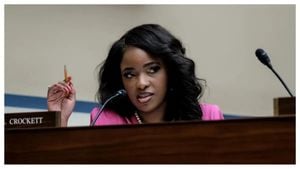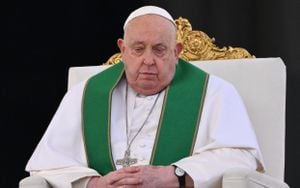The White House press corps is undergoing significant changes following the announcement made by Press Secretary Karoline Leavitt on February 25, 2025. From now on, the White House will determine which reporters are allowed to participate in the press pool, which traditionally comprised journalists selected by the White House Correspondents' Association (WHCA). This shift is seen as a break from over a century of established practices aimed at preventing any administration from gatekeeping press access.
Leavitt characterized the move as fostering inclusivity and giving greater access to new and diverse media outlets. "Moving forward, the White House press pool will be determined by the White House press team," Leavitt stated during her announcement. She emphasized, "A select group of D.C.-based journalists should no longer have a monopoly of press access at the White House." With this new structure, Leavitt aims to invite voices from streaming platforms and other 'new media' representatives.
This restructuring is particularly notable against the backdrop of recent tensions between the Trump administration and major news outlets. Just prior to the announcement, the Associated Press (AP) was barred from covering presidential events due to its refusal to refer to the Gulf of Mexico as the 'Gulf of America'—a directive posed by President Trump. AP officials stated their stance on retaining the historically accurate name following the president’s controversial demand.
Following the termination of their access, the AP filed a lawsuit against Leavitt and two other White House officials, claiming this action represented retaliation against the press for exercising their editorial independence. The suit is grounded on First Amendment principles, arguing, "The press and all people have the right to choose their own words and not be retaliated against by the government." A federal judge recently refused to order the White House to restore the AP's access but has urged the administration to reconsider its stance, hinting at legal vulnerabilities in their position.
Eugene Daniels, president of the WHCA, expressed dismay over the abrupt policy changes, noting, "To be clear, the White House did not give the WHCA board a heads up or have any discussions about today’s announcements." Daniels is concerned about the potential for the Trump administration to control which journalists gain access and assert, "This move tears at the independence of a free press in the United States." He reinforced the WHCA's historical mission of maintaining fair access to all media outlets, assuring their commitment to democratic principles.
While legacy media outlets will still be allowed to join the White House press pool, the new rules create opportunities for less traditional platforms. Leavitt assured reporters, "We will add additional outlets and reporters who are well-suited to cover the news of the day and ask substantive questions of the president of the United States." This signals favorable attention to niche and right-wing media outlets which have increasingly gained presence under the current administration.
Critics argue this decision could fundamentally reshape how the press covers the White House. Sean Spicer, former press secretary, pointed fingers at Daniels, linking the pool shake-up to the WHCA's decision to invite comedian Amber Ruffin, who is perceived as having expressed anti-Trump sentiments, to headline the association's annual dinner event. On social media, Spicer remarked, "If you are a member of the WHCA, you might want to direct blame toward your current President—Eugene Daniels—who proudly invited a Trump hater to their annual elite dinner."
Under the newly structured rules, the composition of the press pool will include representatives from both legacy outlets and new media. The traditional pool typically consists of reporters from three major wire services—Associated Press, Reuters, and Bloomberg—along with television crews, print journalists, radio representatives, and photographers. Leavitt has stated plans for rotating these positions to increase diversity within the press pool. "We want more outlets and new outlets to have the chance to take part in the press pool, to cover the administration's unprecedented achievements up close, front-and-center," she asserted.
Trump's administration has faced criticism for its treatment of journalists, with concerns about fostering censorship and limiting press freedoms. The recent developments bring these discussions to the foreground, challenging the boundaries of journalism's role as a watchdog over government activity.
With press advocacy groups on high alert, the outcome of the AP lawsuit may set significant precedents for media access under the Trump administration, where journalists will need to navigate carefully the terrain of changing press freedoms. The legal and public ramifications of Karoline Leavitt's announcement will likely dominate discourse around journalistic ethics and the fundamental rights enshrined by the First Amendment.
Perhaps most tellingly, this decision reopens debates about the delicate balance of media independence, government accountability, and the democratic principle of free access to information. Will this new structure facilitate broader representation of voices, or will it create barriers to impartial coverage of the administration? Only time will tell how these changes will shape the complex relationship between the press and the White House.



